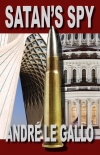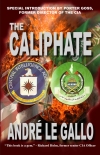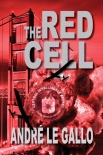Satan's Spy (The Steve Church saga Book 2) by André Gallo (dark academia books to read .TXT) 📗

- Author: André Gallo
Book online «Satan's Spy (The Steve Church saga Book 2) by André Gallo (dark academia books to read .TXT) 📗». Author André Gallo
Then she got up, smiled, and said, “Okay, I’m going to make some dinner.”
“I’ll give you a hand,” Kella said
36. Tehran: Friday-Saturday
Elizabeth and Jeff Crossley had spent Friday, the start of the Iranian weekend, playing tennis with the British First Secretary and his wife on the grounds of the British Embassy and, on Saturday, as dinner guests of the Swiss Ambassador Pierre Klosters and his wife Francine.
The invitation to play tennis had been spur of the moment. However, dinner at the Klosters, which included the Iranian vice minister for trade and the Malian ambassador and their wives, had been planned for weeks. The Malian, officially a Sunni Muslim but closer to an animist with a tradition of Sufism, brought his first wife. She was dressed in a traditional Bambara dress, a colorful dark green mud cloth bubu and head dress that made her seem inches taller.
Although Elizabeth enjoyed the idea of these diplomatic receptions and of being with the people who mattered, part of her felt guilty. Should she not be spending more time with those who had suffered from the West’s arrogant, greedy, colonial policies? She had come with ideas about helping them, much as presidents’ wives often had pet projects such as a reading program, or beautifying the Washington area, or visiting hospitals. Where to find the time? She was so busy attending diplomatic functions because it was part of being an ambassador’s wife.
There was Jafar, of course. He had taught her so much. Jafar was her pet project. She was helping Iran through him, giving him meaningless information.
A part of her knew that his questions on the daily affairs of the U.S. Interests Section were outside a driver’s interests, let alone a lover’s. She understood how these things worked. There was no doubt in her mind that he was being forced into his role of informant. She was helping Iran, but helping Jafar as well. No one was the wiser and no one was getting hurt. The bits and pieces of information she was passing to him were absolutely meaningless and far from anyone’s definition of secret.
It occurred to her sometimes that, eventually, perhaps the Government of Iran would recognize her in a secret ceremony. Would there be a medal? Smiling at herself, she looked like Marlene Dietrich in that fantasy. Maybe she would pick-up smoking.
She was unhappy that Jafar insisted on driving them even on the weekends. She imagined him chatting with the other drivers outside. She hoped that they would all have a chance to eat in the kitchen. Francine had so much food, and there would certainly be leftovers.
Elizabeth admired the way Francine had organized the party, everything was so right, so proper. She would remind Jeff to obtain government funds for official china and silverware. She found Francine to be less friendly than during previous social encounters, probably because, in her role as the hostess, she was required to be equally pleasant to everyone. She understood Francine’s role, but still felt a little bit of resentment that she wasn’t being given star treatment.
Pierre Klosters, on the other hand, was like a mountain lake: clear on the surface with dark depths, cold unless warmed externally. A compact-looking man with a clipped mustache, Klosters’ degree from Oxford had given him rights to a British-accented English and an affectation for ascots.
During the dinner, Elizabeth enjoyed pointing out the dangers of economic development without proper environmental safeguards to Hawaye, the Malian ambassador’s wife. Having written several articles and papers on the subject, she found it fulfilling to discourse, and teach, about the dangers of overlooking, or rather under-appreciating, the role of vegetation in the balance of nature when man was intent on destroying it by building factories.
Hawaye, smiling and nodding her head frequently, was clearly happy to be sitting next to her at the dinner.
* **
Crossley, his mind on his next telegram back to the Department, asked Klosters, “What are your thoughts on this election? The challenger seems to be popular.”
“That’s because he is a reformer, a moderate reformer but a reformer nonetheless, on the European model.” Klosters said reaching for his wine glass. “The whole world, including your country Jeff, is coming around to the conclusion that European socialism is, in the end, where society is going. Many of his Iranian supporters/backers have European educations or connections.”
“I wonder if that’s true outside of the big cities,” Crossley offered, surprised at the ambassador’s confidence. “Also, as prime minister, he ran the economy more like a Soviet centralized plan than like the European model.”
He glanced at the Iranian minister conscious that his comment might not have been diplomatic. Klosters’ comment reminded him of a class he had taken at the Foreign Service Institute about “image projection,” the idea that it was a mistake to see other countries through the same standards and values, the same glasses, as those you used to measure your own country.
The Iranian minister had been quiet but now seemed uneasy at the turn the conversation had taken. He took the napkin from his lap and wiped his mouth.
“It’s interesting to hear the thoughts of outsiders,” he said looking at Crossley, “even when they are inexperienced. Please tell Washington





Comments (0)